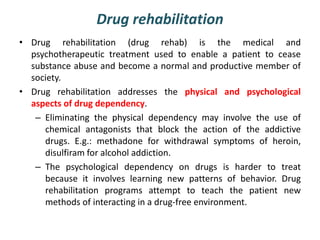The Ultimate Guide To Drug Rehabilitation
The Ultimate Guide To Drug Rehabilitation
Blog Article
Drug Rehabilitation Things To Know Before You Buy
Table of ContentsThe 8-Minute Rule for Drug RehabilitationLittle Known Questions About Drug Rehabilitation.8 Easy Facts About Drug Rehabilitation ExplainedAll About Drug RehabilitationDrug Rehabilitation Can Be Fun For Everyone
This includes dealing with the entire person to ensure that every one of the underlying reasons and impacts of the dependency are properly taken care of and dealt with. This gives individuals the tools they need for a full return to a pleased, healthy, substance-free life. Drug dependency "treatment" is a little bit of a deceptive term it implies that people with dependencies are "all far better" after they have gotten some kind of treatment.Also people with years of effective healing need to stay conscious of their capacity for relapse, and they must make use of the devices they discovered in therapy to avoid it. Words "rehab" also suggests that a person is being remedied after misbehaving, which follows society's preconception regarding dependency. Drug Rehabilitation. Part of the healing procedure is for people with addictions, and their family members, to find out that addiction refers biology and not principles
After all, transitioning from physical and psychological dependency to a healthy and pleased lifestyle is a large adjustment. It is very important that the steps to medication rehabilitation be effectively dealt with throughout the medication rehab process. There are four phases of dependency recovery: Dependency evaluation is a specifically critical part of the rehabilitation process.
This is part of the underlying psychology of addiction, and it enhanced by worries of apprehension for belongings and judgment from household and buddies. The analysis process needs getting trust and damaging with that secretive nature. The private needs to identify which materials were utilized and the extent of their compound use.
How Drug Rehabilitation can Save You Time, Stress, and Money.

For many individuals with dependencies, worry of withdrawal is a significant barrier to escaping their addiction, which anxiety maintains them from even attempting. Withdrawal and medicine detox do not have to be an awful experience. By taking part in a clinical detox program, individuals can obtain with the experience securely and pleasantly.
For most individuals with compound addiction, their material usage is no longer about getting high. Drug rehab is the process where the deep issues around the dependency are determined and resolved.
Drug Rehabilitation Things To Know Before You Get This
Instead, it can be claimed that rehab is the process of discovery, while what happens afterward is recuperation. The addicted mind commonly begins to think especially after an amount of time in abstinence that it is OK to attempt alcohol consumption or using materials once again. This hardly ever works, and the substantial bulk of people that attempt drinking or making use of medicines once more will swiftly end up where they were previously.

Sober living homes are a specifically effective method to aftercare when a person is discharged from rehab. Individuals and their households ought to talk about these options with their therapists while still in rehab. There are various sorts of treatment for addiction, based on the level of treatment given. When selecting the degree of therapy, the option needs to be based upon what will certainly provide the specific the very best opportunity of success in recuperation not on what the specific intends to do.
This is a bad mix, as it thrusts many people to think that they can quit using drugs or drinking on their very own. They might be hesitant to see and admit that they need a greater level of treatment, such as inpatient rehab. Detoxification from a substance is not the like treatment for compound addiction.
Some Known Details About Drug Rehabilitation
, people's minds are muddled and they really feel literally and psychologically unwell. They are not responsive to any type of kind of therapy or treatment up until their minds clear and they are really feeling better.
Like inpatient therapy, household therapy provides the therapeutic effect of removing individuals from their useless way of living and atmosphere and putting them in secure, healthy surroundings. This enables them to reorient their lives and believed processes while article concentrating on distraction-free healing. Residential rehab varies from inpatient rehab (Drug Rehabilitation) in that it is carried out in a center outside of the healthcare facility system and usually involves a longer stay.
A partial hospitalization program is midway in between this inpatient and outpatient treatment. People get therapeutic solutions on-site throughout the day, but go home or to a sober living facility in the evening. This program is ideal for individuals that have a high assumption of success along with the capacity and understanding to be a lot more self-directed in their routine.

The Facts About Drug Rehabilitation Uncovered
Long-lasting residential treatment programs frequently use a therapeutic method referred to as the restorative area (TC). This is a technique to re-socializing people whose addiction has seriously influenced their capacity additional resources to match culture. These consist of individuals with major criminal habits, people who are homeless, adolescents and people with significant mental health and wellness conditions.
Report this page